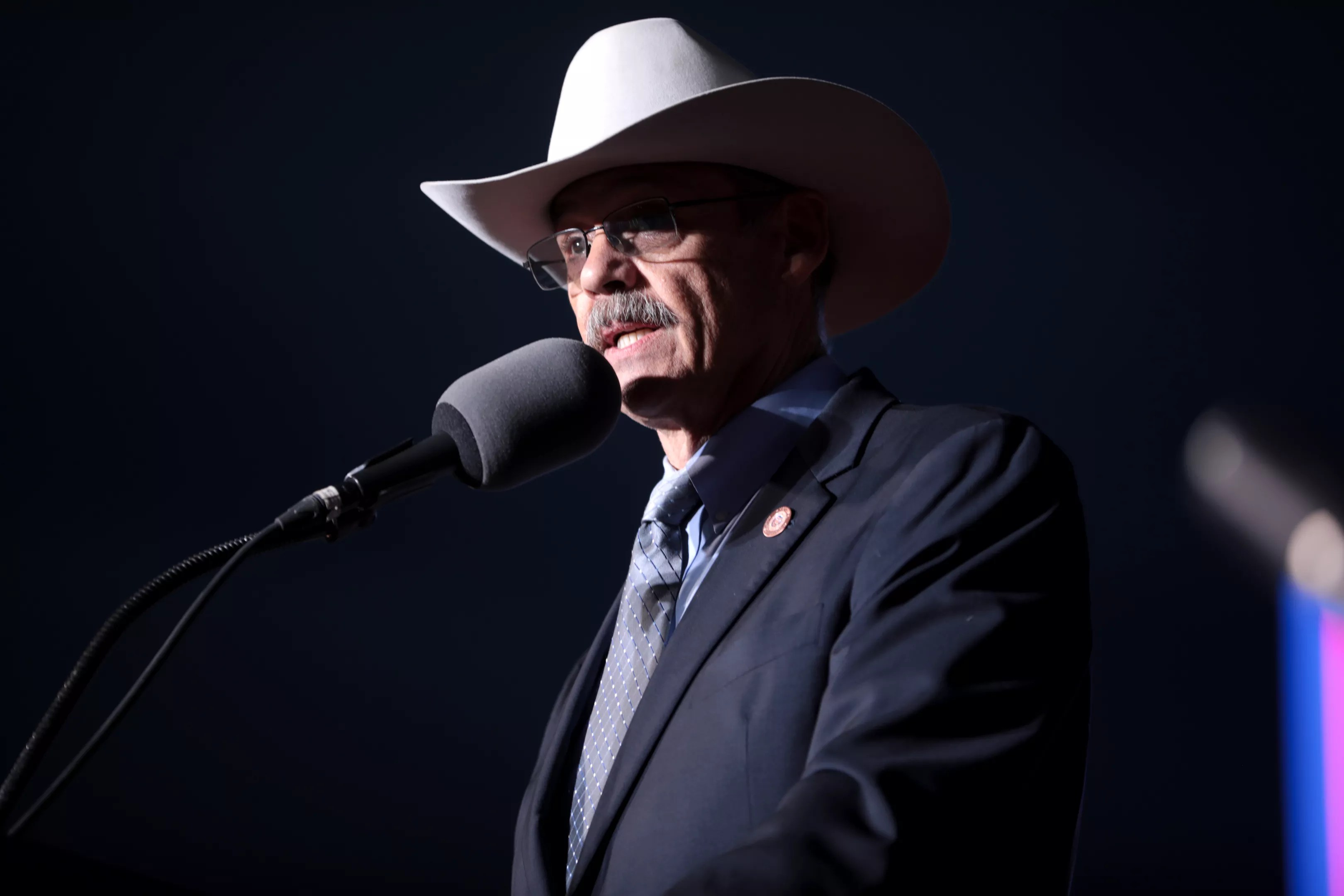
Gage Skidmore

Audio By Carbonatix
As the drama of the 2020 presidential election wound down, Arizona State Representative Mark Finchem had a hunch.
A hunch that Democrats had tampered with the 17 local, state, and federal races in Pima County.
Finchem, a Tucson Republican, didn’t used to be a conspiracy theorist. Then he received an email, one week after the 2020 general election, that sent him tumbling down the Big Lie rabbit hole.
He became so convinced that the sanctity of Arizona’s elections has been thoroughly deflowered, he even doubled down and called fraud on his own win in the 2020 general election, according to emails leaked to Phoenix New Times.
Finchem not only propagated the tirelessly debunked Big Lie that the 2020 presidential election was stolen from Donald Trump, but he played an intimate role in concocting it – along with other offshoot conspiracy theories centered around election fraud. The conspiracy theory czar demanded an emergency grand jury convene to investigate allegations that more than half a million votes for Democratic candidates were planted by a high-ranking liberal cabal in races across the county.
“The growing body of evidence showing election fraud is stunning,” Finchem said in one email sent to seven Arizona Republicans in November 2020 and provided to New Times.
The recipients included then-State Representative Bret Roberts, who resigned in 2021 and gave no reason, and Frosty Taylor, a Maricopa County Republican Committee member and one-time award-winning editor of the short-lived Paradise Valley News-Progress.
Finchem is not able to seek another two years in the state House due to Arizona’s four-term limit. That’s part of why he’s running for secretary of state and gunning to replace Katie Hobbs, the Democratic incumbent. The other reason: Finchem has grave concerns about the chain of custody for mail-in ballots, the preferred method of voting for more than 90 percent of Arizona voters.
For Finchem, the Big Lie started with a November 10, 2020, email to the U.S. Department of Justice from a person who identified himself as Brian Watson. Watson later forwarded that email to Finchem.
In the email, Watson claims that he was invited to a secret meeting “by the democrat party” that was held in “Pima County Arizona” on September 10, 2020. He begs for anonymity and asks not to be contacted, apparently unaware that his email would be a public record.
At the meeting, unnamed high-ranking Democrats shared their plot to embed hundreds of thousands of fake votes, he claimed. It would have been one of the most prodigious cases of election fraud in American history.
“There were approximately 35,000 fraud votes added to each democrat candidate’s vote totals,” Watson wrote. “Candidates impacted include county, state, and federal election candidates.”
Even if there were fraudulent votes in the 2020 election, Felipe Perez, Finchem’s Democratic opponent, didn’t have enough to win. Finchem won election to a fourth term in the Arizona House. Without the fraudulent votes cited in Watson’s email, President Joe Biden and U.S. Senator Mark Kelly, both Democrats, would both still have won Pima County.
Everyone who received Watson’s email ignored it. Except for Finchem. He called on Arizona Attorney General Mark Brnovich to convene a grand jury to substantiate Watson’s claims.
Chris Baker, a Republican consultant who was one of the seven recipients of Watson’s emails, said he tried to email Watson in 2020, but the account was already deactivated. Baker managed Finchem’s campaigns at the time but no longer works with him.
“Mark really bought into the idea that something had gone wrong with the election and was in a mindset to believe what anyone said, including a no-name person using a made-up email,” Baker told New Times.
“It only ever existed for that one email, and I explained that to Mark,” he continued. “Mark wanted to believe it, so he put aside all his legislative expertise, any common sense he had, and decided that it was true even when all evidence indicated it was false.”
Baker spent hours explaining to Finchem that the email was “nothing more than a random person trying to have fun with him and other legislators,” he said. “It should not be taken remotely seriously.”
Emails from New Times to Watson couldn’t be delivered because the address no longer exists. Finchem did not respond to interview requests from New Times.

State Senator Michelle Ugenti-Rita speaks with attendees at the “Rally to Protect Our Elections” hosted by Turning Point Action at Arizona Federal Theatre in Phoenix in July 2021.
Gage Skidmore
“On his own kamikaze mission”
On Tuesday, Finchem will face three challengers in the Republican primary. Finchem claimed in a recent email that he is “leading in the polls, but not by much.” Political insiders told New Times that the race will come down to either Finchem or Arizona State Senator Michelle Ugenti-Rita.
Ugenti-Rita doesn’t deny the Big Lie, but even she criticized Finchem for taking the cryptic tip seriously.
“He is constantly off trying to pursue things that are not based in reality,” Ugenti-Rita told New Times. “It’s like he’s on his own kamikaze mission.”
Ugenti-Rita said Finchem isn’t in the race to build relationships with businesses and secure Arizona’s elections but to get former President Donald Trump back in office.
Finchem represents District 11, which comprises mostly rural communities along Interstate 10 between Phoenix and Tucson. He falsely declared himself an elector for Trump. Then he took credit for planning the January 6, 2021, attack on the U.S. Capitol.
Finchem, in campaign emails, said he still has plans to decertify the 2020 presidential election if he wins his secretary of state bid – even though there is no legal mechanism to do so.
“He is fine misleading the public, letting them believe that you can do something like decertification,” Ugenti-Rita said. “It shows his lack of understanding about how elections run. He wants to rewrite history and get one person into office again. It’s emblematic of his entire campaign – he is singularly focused on things that have to do with his own personal race and the former president. It has nothing to do with voters throughout the state of Arizona or the secretary of state race.”
Watson’s email doesn’t include an address or name a single person. Watson sent the tip a full six weeks after the meeting allegedly took place and didn’t provide any proof of the outrageous claims he supposedly heard about election fraud.
He recounted that an anonymous cabal member told him the method of fraud used, sporadically embedding fake votes in Pima County’s automated voting machines, “has been testing and has shown significant success in Arizona.”
“It never occurred to me that Mark would be dumb enough to be fooled by that email,” Baker said. “All anyone has to do is read that email, look at what it says, spend about five seconds using the common sense that we all have, and you would come to the conclusion that this was a joke.”
But Watson’s email fits Finchem’s narrative, one he only adopted in 2020 after a six-year tenure as a relatively unproblematic lawmaker, according to Baker.
These days, his rants are centered on baseless theories about large-scale criminal conspiracy and claiming elected officials in Arizona are pedophiles.
“My race for secretary of state of Arizona is one of the most important in the country,” Finchem said in a campaign email on Monday. “I don’t need to remind you that Arizona has been the epicenter of fraud in America’s elections, and it is my singular goal to make sure that Arizona once again has free and fair elections, that Arizona is the gold standard for election integrity.”
His only hard evidence is an affidavit filed in federal court in Phoenix in June that proclaims Arizona’s elections are rife with fraud and references the bogus DOJ tip. Walter Daugherity, a consultant for the conservative evangelical nonprofit Truth & Liberty Coalition, filed the affidavit as part of gubernatorial candidate Kari Lake’s lawsuit against Hobbs.
Daugherity listed a dissertation he wrote in 1996 about the southern pine beetle among the research that qualified him to make claims about election integrity in Arizona.
Finchem was subpoenaed for phone records by the U.S. House Select Committee on the January 6 attack. But still, he claims he’s poised to win the GOP nomination early next week.
Baker’s internal polls, though, suggest Ugenti-Rita has the edge.
“The Democrats in this race know that I am the one they cannot beat,” Ugenti-Rita said. “They are salivating at the potential of having Mark win the primary because they will pulverize him. He hasn’t done anything to show that he knows what he’s talking about.”
If Finchem wins, only time will tell if he’ll be able to survive a four-year term without facing consequences for his role in last year’s insurrection.